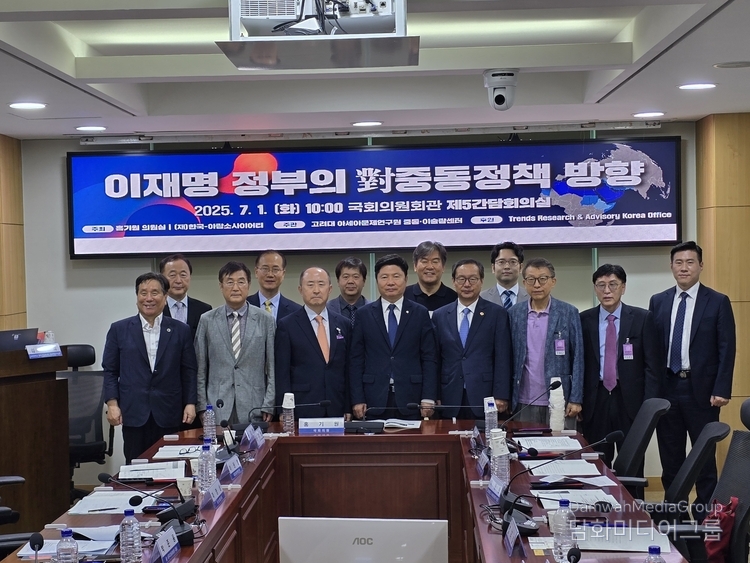By Diplomacy Journal Lee Kap-soo
Amid rapidly shifting dynamics in the Middle East, a seminar titled “Middle East Policy Direction of the Lee Administration” was held on July 1, at the 5th Meeting Room of the National Assembly Members’ Office Building. The event aimed to explore practical foreign policy strategies for the region based on South Korea’s national interest.
The seminar was co-hosted by Rep. Hong Ki-won (Democratic Party of Korea, Pyeongtaek A), a member of the Foreign Affairs and Unification Committee, and the Korea-Arab Society, and organized by the Center for Middle East and Islamic Studies at Korea University’s Asiatic Research Institute, with support from Trends Research & Advisory Korea Office.

In his opening remarks, Kim Chang-mo, Secretary-General of the Korea-Arab Society, emphasized, “Given the humanitarian concerns and political interests intertwined in the region, Korea must establish a diplomatic approach that reflects both its stance and its growing global stature.”
In his welcoming speech, Rep. Hong Ki-won noted, “Although the Middle East holds significant importance both for Korea and in global geopolitics, it has remained relatively overlooked. I hope this seminar offers a valuable opportunity to reassess our policy direction as the Lee administration takes office.”
Professor Lee Jin-han, Director of the Asiatic Research Institute at Korea University, added in his congratulatory remarks, “This seminar is timely and will serve as a meaningful reference for future government policymaking. We also intend to host more emergency-response seminars in times of Middle East crises.”
Ambassador Yoon Kang-hyun, former Ambassador to Iran and the seminar’s keynote speaker, highlighted the strategic significance of the Middle East as “a vital transport hub linking three continents and all major African cities,” and “a region with both the purchasing power and execution capacity to realize large-scale projects.”
Ambassador Yoon urged the government to:
• demonstrate independent strategic intent in its Middle East diplomacy,
• develop region-specific diplomatic solutions,
• move beyond viewing the Middle East merely as a market and instead engage as a strategic partner.
He also called for practical cooperation beyond MOUs, including the appointment of special envoys to sensitive areas and continued people-to-people exchanges.
On economic cooperation, Dr. Lee Kwon-hyung, Senior Research Fellow at the Korea Institute for International Economic Policy (KIEP), stated, “Due to Korea’s energy-focused ties with the Middle East, fluctuations in oil prices significantly affect trade volume and project orders. We must diversify cooperation beyond energy into broader sectors.”
He proposed specific measures, including:
• convening a Korea–Middle East summit,
• expediting the ratification of the Korea–GCC FTA, concluded in 2023, and
• pursuing participation in the India–Middle East–Europe Economic Corridor (IMEC).
The subsequent panel discussion featured:
• Ma Young-sam, former Ambassador to Israel,
• Park Joon-yong, former Ambassador to Saudi Arabia,
• Kim Deok-il, Director of Political Economy at Korea University’s Middle East and Islamic Center, and
• Kim Jong-do(Musa), Director of Trends Research & Advisory Korea Office
Panelists offered diverse proposals for strengthening Korea–Middle East cooperation, including:
• expanding Official Development Assistance (ODA),
• promoting trust-based diplomacy, and
• establishing a dedicated foundation for long-term policy research on the Middle East.
Rep. Hong concluded, “We will do our utmost to ensure the ideas discussed today lead to substantive policies that support the Lee administration’s pragmatic and national interest–centered diplomacy toward the Middle East.”







